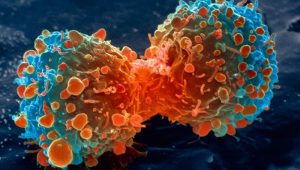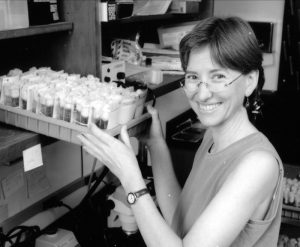Enter your address to receive notifications about new posts to your email.
Articles tagged Drosophila
(138 results)
-
In memoriam: Bruce Baker
Bruce Stewart Baker—the geneticist whose work uncovered molecular mechanisms of Drosophila sex determination and dosage compensation—died unexpectedly on July 1, 2018. He was 72. Bruce Baker was born on Dec 20, 1945 to William K. (Bill) Baker—also a renowned Drosophila geneticist —and Margaret I. Stewart in Swananoa, NC, the site of the closest army hospital…
-
Using fruit flies to find rare disease treatments
An automated drug screening approach gives insight into rare NGLY1 deficiency. Sometimes, diagnosing and treating an illness is straightforward. Other times, the diagnosis is challenging while the treatment is simple—or vice versa. In the case of a rare disease like NGLY1 Deficiency, both diagnosis and treatment can feel unreachable. The complex challenges of rare diseases…
-
How similar are fruit fly and human cancers?
New evidence for genome instability in fly tumors suggests key similarities—and differences—from human disease processes. Human cancers display a variety of abnormal genomic features, including increased numbers of single nucleotide variants (SNVs) and copy number variants (CNVs). However, a 2014 study on a fruit fly tumor detected no elevation of SNVs or CNVs compared to non-tumor…
-
ModERN treasure: hundreds of worm and fly transcription factor binding profiles cataloged
Offshoot of the modENCODE project provides crucial data and strains for understanding gene regulation. Following a multidisciplinary effort spanning six institutions, researchers working on the modERN (model organism Encyclopedia of Regulatory Networks) project have released a powerful resource for biologists studying the fruit fly Drosophila melanogaster and the nematode worm Caenorhabditis elegans. So far, report Kudron,…
-
Mito-nuclear interactions could influence disease variability
A new fruit fly model of Leigh syndrome reveals the importance of mtDNA variation. Inherited mitochondrial disorders pose a perplexing problem to researchers and clinicians: people with the same condition can have vastly different clinical manifestations, even if they share the same mutation. For example, a neurodegenerative disorder called Leigh syndrome, which can be caused…
-
A splice in timeless
Photosensitive alternative splicing of a malt fly circadian clock gene varies between northern and southern populations. Over the course of a day, most organisms undergo profound changes. Over the course of a season, the changes can be even more dramatic. For example, insects’ responses to the brisk nights and cooler days of fall and winter…
-
Alternative splicing tunes sex differences in flies
The Y chromosome has an unanticipated role in sex-biased intron retention in Drosophila. Differences between males and females in sexually dimorphic species stem in part from disparities in gene expression. This sex-biased expression can be achieved through numerous means, one of which is alternative splicing. In a recent study, Wang et al. investigated differences in one…
-
A remembrance: Dr. Kathleen A. Matthews & the Bloomington Drosophila Stock Center and FlyBase
Guest post by Thomas Kaufman in memory of Kathy Matthews. The original Drosophila Stock Center was housed at Cal Tech in Pasadena and was established by Calvin Bridges and Alfred Sturtevant—students of Thomas Hunt Morgan. On Morgan’s and Bridges’ deaths, the responsibility for the collection fell to Sturtevant, who subsequently passed it to his student…
-
A new role for a signpost on the chromatin landscape
Monomethylated H3K27 is more than just an intermediate. We often talk about biological traits as if they’re written in our DNA, but some of them aren’t in our DNA at all—instead, they’re on it in the form of chemical tags on the histone proteins our genomic DNA is wrapped around. During development, each cell’s genome…
-
Preview the lineup at the 59th Annual Drosophila Research Conference
Don’t miss out on this year’s Annual Drosophila Research Conference; check out the fantastic lineup of invited speakers below! The conference will be held April 11–15, 2018 at the Philadelphia Marriott Downtown, covering a diversity of topics, from genetics, to molecular biology, cell biology, development, immunology, physiology, neuroscience, evolution, and more. As well as the…
-
Talk shop at the #Dros18 community lunch
Take a deep dive into the latest topics in our field over lunch at the 59th Annual Drosophila Research Conference. Each discussion at the Community, Connections, & Lunch event will be moderated by established and up-and-coming community leaders, who will explore the latest scientific findings, such as presentations from the conference and hot topics in…











